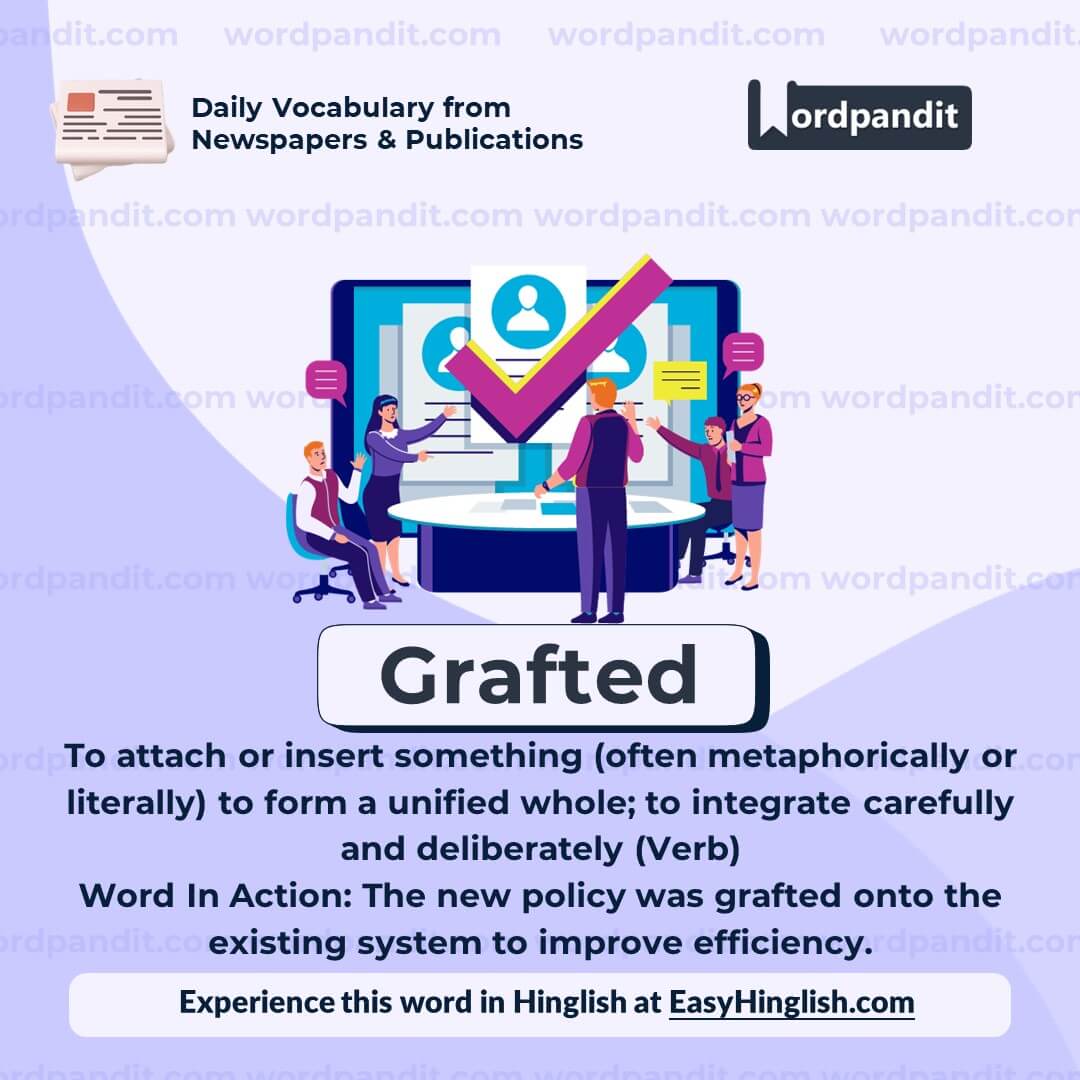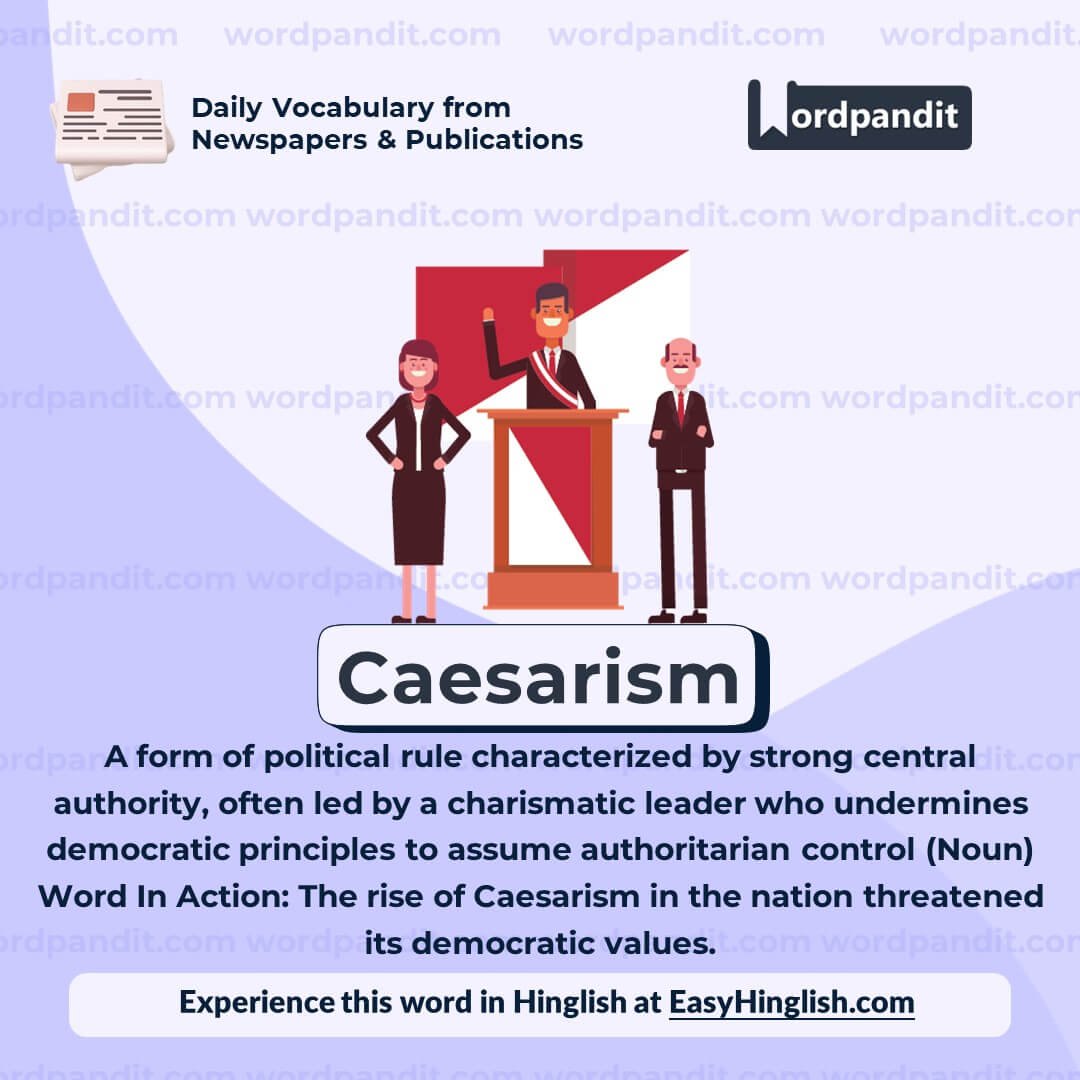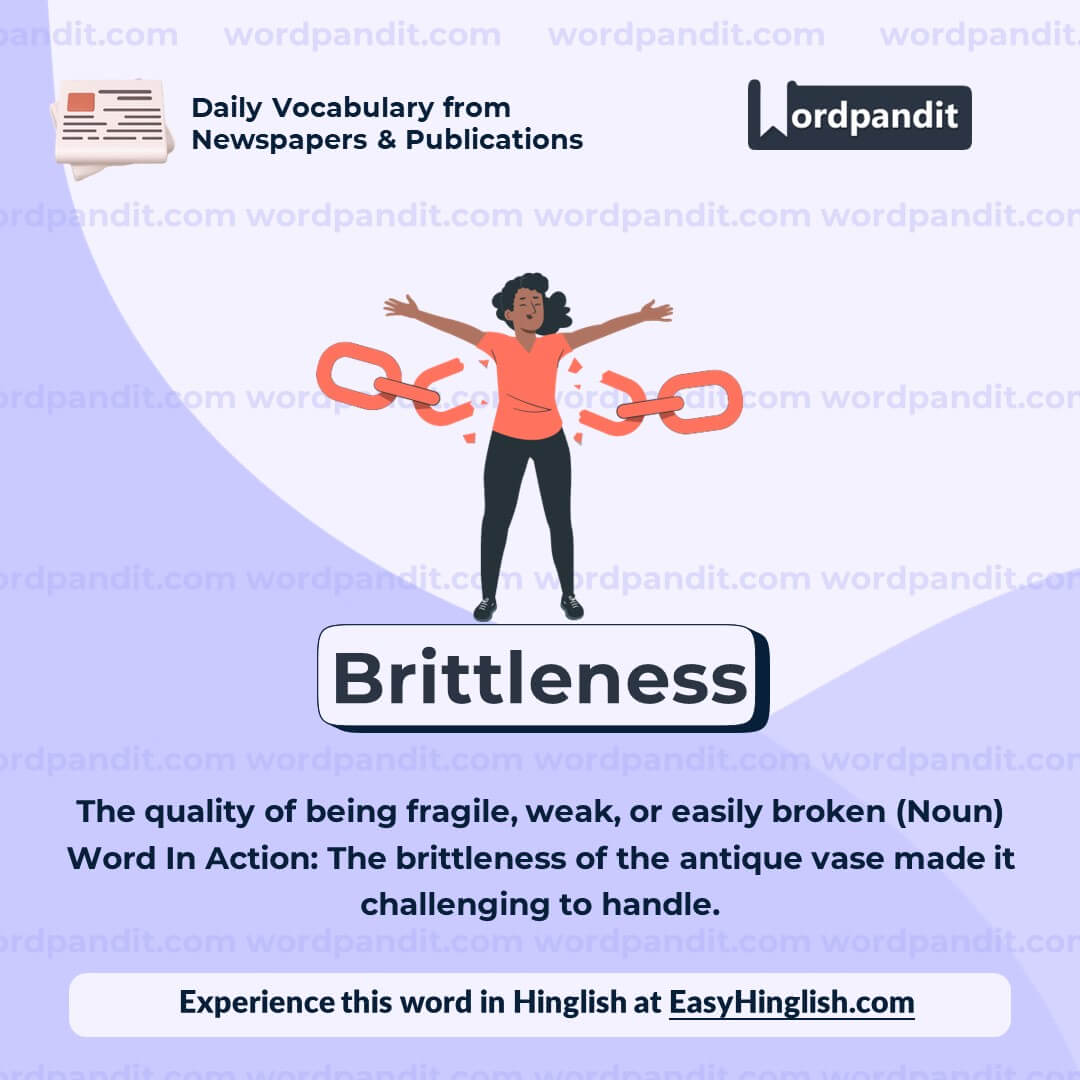Daily Vocabulary from Indian Newspapers and Publications
Welcome to Wordpandit’s Indian Vocabulary Hub
At Wordpandit, we understand the importance of staying rooted in the local context while expanding your language skills. This section focuses on enriching your vocabulary with words and phrases drawn from India’s leading newspapers and publications, ensuring you're learning vocabulary that is practical, relevant, and uniquely Indian.
Why Indian Sources Matter
We believe that the best way to master any language is by immersing yourself in local content. That’s why we carefully curate vocabulary from top Indian publications, including:
- The Hindu
- The Times of India
- The Economic Times
- Hindustan Times
- Live Mint
- The Indian Express
- And many others...
Stay Updated, Stay Relevant
With daily updates from Indian news sources, you’ll be consistently learning words that reflect the trends and shifts in Indian society and culture. Our focus is to provide vocabulary that enhances your understanding of the language in an Indian context.
How Wordpandit Supports Your Goals
Whether you’re preparing for exams, aiming to improve your professional communication, or simply want to stay connected with the latest Indian vocabulary, Wordpandit is here to guide you every step of the way.
Learn with a Practical Approach
Our interactive learning methodology includes real-world examples, engaging activities, and context-specific usage to ensure that every word becomes part of your active vocabulary.
Dive into Indian Vocabulary Today!
Why Choose Wordpandit?
Practical Learning: Focus on words you'll actually encounter in real-world reading, enhancing your comprehension and communication skills.
Diverse Content: From current affairs to scientific breakthroughs, our varied sources expose you to vocabulary across multiple domains.
Effortless Integration: Make Wordpandit a part of your daily routine. Just a few minutes each day can significantly boost your lexicon over time.
Your Path to Vocabulary Mastery
- Visit our Daily Vocabulary section regularly
- Explore new words and their usage in context
- Practice incorporating these words into your own writing and speech
- Track your progress as your vocabulary expands
Start Your Journey Today
Embark on your vocabulary enhancement journey with Wordpandit. By consistently engaging with our daily posts, you'll build a robust vocabulary that serves you well in academic, professional, and personal contexts.
Remember, a word a day keeps linguistic limitations at bay. Make Wordpandit your daily companion in the quest for vocabulary excellence!
WORD-1: Grafted
Context:
"The opposition in India has been on a roller-coaster since India’s parliamentary democracy was carefully grafted and nurtured since the first general elections in 1951-52." - The Wire
Explanatory Paragraph:
The word "grafted" often refers to the process of joining one thing to another in such a way that they grow together or form a unified whole. In the context of democracy, it means the deliberate integration of a system or concept into a particular society or framework, ensuring it takes root and thrives. Just as a plant graft relies on careful nurturing, the idea of parliamentary democracy in India required care and persistence to grow and become an integral part of the nation.
Meaning: To attach or insert something (often metaphorically or literally) to form a unified whole; to integrate carefully and deliberately. (Verb)
Pronunciation: graft-ed
Difficulty Level: ⭐⭐⭐ Intermediate
Etymology: Originates from Middle English "graften," which derives from Old French "grafter" (to insert a scion), and ultimately from the Late Latin "graffare," based on the Greek "graphion," meaning stylus or pencil.
Synonyms & Antonyms:
Synonyms: attach, embed, incorporate, implant, integrate
Antonyms: remove, detach, separate, sever, uproot
Usage Examples:
- The botanist skillfully grafted the new variety of fruit onto the old tree.
- The new policies were grafted onto the existing legal framework to address emerging challenges.
- She grafted elements of her cultural heritage into her modern artwork, creating a unique fusion.
- The surgeon successfully grafted skin from the patient’s thigh to cover the burn wounds.
Cultural Reference:
"India’s democracy was a unique experiment where the ideals of Western parliamentary systems were grafted onto a deeply diverse and hierarchical society. This required careful adaptation and effort over decades to ensure its survival." - Based on historical analysis
Think About It:
How do you think the process of "grafting" applies to integrating new ideas or systems into long-standing traditions without losing their essence?
Quick Activity:
Write a short paragraph explaining how a new technology or concept could be grafted onto an existing educational or healthcare system in your country.
Memory Tip:
Think of "graft" as a "gift" you attach to something else, making it stronger or more functional, just like grafting a branch onto a tree.
Real-World Application:
In modern times, the idea of grafting is often used metaphorically in areas like politics, technology, and culture, where new ideas or innovations are carefully integrated into existing systems for improvement or adaptation.
WORD-2: Caesarism
Context:
"Nehru wrote an article in 1937 under the pseudonym Chanakya that his immense popularity had all the dangers of Caesarism, a charismatic leader turning a dictator." - The Wire
Explanatory Paragraph:
"Caesarism" refers to a political system or situation where a leader, often one who is charismatic and highly popular, consolidates power in a manner that undermines democratic principles and leads to authoritarian rule. The term draws from the rule of Julius Caesar, the Roman leader whose accumulation of power contributed to the decline of the Roman Republic and the rise of imperial autocracy. Caesarism warns of the potential for leaders to transition from democracy to dictatorship through excessive centralization of power.
Meaning: A form of political rule characterized by strong central authority, often led by a charismatic leader who undermines democratic principles to assume authoritarian control. (Noun)
Pronunciation: SEE-zur-izm
Difficulty Level: ⭐⭐⭐⭐ Advanced
Etymology: The term originates from the name Julius Caesar, the Roman general and dictator. It became a political concept in the 19th century, especially through the writings of French historian Hippolyte Taine and others, who used it to describe authoritarian leadership.
Synonyms & Antonyms:
Synonyms: autocracy, dictatorship, authoritarianism, despotism, tyranny
Antonyms: democracy, republicanism, egalitarianism, pluralism
Usage Examples:
- The rise of Caesarism in the nation alarmed political analysts who feared the erosion of democratic institutions.
- History has shown that Caesarism often arises during times of economic instability and social unrest.
- Critics accused the leader of promoting Caesarism by concentrating all decision-making power in his office.
- The philosopher wrote extensively on the dangers of Caesarism, warning that it can often emerge under the guise of populism.
Cultural Reference:
"The term 'Caesarism' has been used in modern political discourse to critique leaders like Napoleon Bonaparte and Adolf Hitler, who relied on their charisma and public appeal to centralize power and establish authoritarian regimes." - Historical Analysis
Think About It:
How can societies guard against the rise of Caesarism while still allowing charismatic leaders to play important roles in democratic systems?
Quick Activity:
Research a historical or contemporary leader who was accused of Caesarism. Write a short paragraph summarizing their leadership style and its impact on democracy.
Memory Tip:
To remember "Caesarism," think of Julius Caesar—the historical figure who amassed power at the expense of the Roman Republic, symbolizing how excessive power can undermine democratic structures.
Real-World Application:
In modern politics, Caesarism is often invoked to critique leaders or movements that centralize power and bypass democratic norms. Understanding this term can help citizens recognize potential threats to democracy and advocate for checks and balances.
WORD-3: Deputed
Context:
"When P.V. Narasimha Rao during his premiership deputed Vajpayee as leader of the Indian delegation to the special session of the United Nations Human Rights Commission (UNHRC) in Geneva." - The Wire
Explanatory Paragraph:
The word "deputed" refers to assigning someone a task, role, or responsibility, especially in an official or formal capacity. It often implies entrusting a person with a specific duty on behalf of a higher authority or organization. In the given context, P.V. Narasimha Rao formally appointed Vajpayee to represent India at a key international forum, showcasing both trust and delegation of responsibility in governance.
Meaning: Assigned a duty or responsibility to someone, typically in an official capacity. (Verb)
Pronunciation: dih-PYOO-ted
Difficulty Level: ⭐⭐⭐ Intermediate
Etymology: Derived from the Latin "deputare," meaning to assign or allot. It entered Middle English through Old French, retaining its sense of delegation or appointment.
Synonyms & Antonyms:
Synonyms: appointed, assigned, delegated, entrusted, commissioned
Antonyms: dismissed, removed, retained, rejected
Usage Examples:
- The manager deputed her assistant to oversee the project while she was on leave.
- The government deputed a special envoy to mediate peace talks between the warring factions.
- She was deputed to organize the charity event on behalf of the committee.
- The officer was deputed to a remote village to ensure law and order during the elections.
Cultural Reference:
"The concept of deputing someone to act on behalf of others has deep roots in governance, seen as early as the Roman Empire, where representatives were appointed to manage distant provinces on behalf of the central government." - Historical Insight
Think About It:
What qualities do you think are essential in a person who is deputed to represent a country or organization on an international stage?
Quick Activity:
Think of a situation in your school, workplace, or community where someone was deputed for a task. Write a brief paragraph describing their role and its outcome.
Memory Tip:
To remember "deputed," think of "duty" being assigned to someone officially. The "de-" prefix suggests delegation of authority.
Real-World Application:
In workplaces, governments, and international organizations, deputing individuals is essential for efficient management. For example, CEOs often deputize executives to handle specific divisions, and countries depute diplomats to foster foreign relations.
WORD-4: Brittleness
Context:
"So much so, given the brittleness of the parties in the opposition, factions within the Congress functioned as opposition." - The Wire
Explanatory Paragraph:
The term "brittleness" refers to the quality of being fragile or easily broken, either physically or metaphorically. In the context of political parties, it highlights their instability, lack of cohesion, or inability to withstand external or internal pressures. Brittleness signifies a state of vulnerability where small disruptions can cause significant fractures or breakdowns.
Meaning: The quality of being fragile, weak, or easily broken. (Noun)
Pronunciation: BRIT-l-ness
Difficulty Level: ⭐⭐⭐ Intermediate
Etymology: Derived from the Old English "bryce," meaning to break, and the suffix "-ness," indicating a state or condition. The word evolved to describe not just physical breakability but also metaphorical weakness.
Synonyms & Antonyms:
Synonyms: fragility, weakness, delicacy, instability, frailty
Antonyms: resilience, toughness, durability, strength, flexibility
Usage Examples:
- The brittleness of the glass made it unsuitable for use in construction.
- The brittleness of their friendship became evident during the argument over a trivial issue.
- The company’s financial brittleness was exposed during the economic downturn.
- Political analysts have often commented on the brittleness of coalitions formed solely to defeat a common opponent.
Cultural Reference:
"Brittleness" has often been used metaphorically in literature and speeches to describe situations where external appearances of strength hide underlying fragility. For instance, in Shakespeare’s *Hamlet*, brittle relationships and alliances lead to dramatic conflicts and betrayals." - Literary Analysis
Think About It:
How can individuals or organizations address their brittleness to become more resilient in the face of challenges?
Quick Activity:
Identify an example from history, politics, or sports where brittleness led to failure. Write a short paragraph explaining how the situation could have been handled differently.
Memory Tip:
To remember "brittleness," think of "brittle" objects like dry twigs or thin glass that snap or shatter easily when pressure is applied.
Real-World Application:
Understanding brittleness is essential in fields like engineering, politics, and psychology. For instance, engineers must design materials that avoid brittleness under stress, while leaders must work on strengthening organizational resilience to avoid collapse under pressure.
WORD-5: Configuration
Context:
"Perceptual enhancement occurred without participants even realising. Crucially, the faster response to visual stimuli was not observed when participants viewed neutral images like geometric configurations." - Money Control
Explanatory Paragraph:
The word "configuration" refers to the arrangement or organization of the parts or elements of something. It is used to describe how individual components are positioned to form a whole. In the context of the given sentence, "geometric configurations" refers to specific patterns or layouts of geometric shapes. The term is broadly applicable in fields like technology, design, and psychology, describing structured layouts or setups.
Meaning: The arrangement of parts or elements in a particular form, figure, or combination. (Noun)
Pronunciation: kon-fi-gyuh-RAY-shun
Difficulty Level: ⭐⭐⭐ Intermediate
Etymology: Derived from Latin "configurare," meaning "to form or shape," and the suffix "-tion," which denotes a state or condition. The word entered English in the late 16th century.
Synonyms & Antonyms:
Synonyms: arrangement, layout, setup, formation, structure
Antonyms: disorder, disorganization, chaos, randomness
Usage Examples:
- The configuration of the new software system made it more user-friendly and efficient.
- Scientists studied the molecular configuration of the compound to understand its chemical properties.
- The interior designer proposed a new configuration for the office furniture to improve workflow.
- The intricate configuration of the puzzle pieces made it challenging to complete.
Cultural Reference:
"Configuration" is a key term in technology and design. For instance, in computer systems, configurations determine how hardware and software components interact. This idea is also reflected in the design of architectural spaces, such as the famous geometric configurations in Frank Lloyd Wright's architectural designs." - Design History
Think About It:
How does the configuration of objects or systems impact their functionality and efficiency? Can you think of an example where changing the configuration led to significant improvements?
Quick Activity:
Draw or describe a configuration of shapes that you think represents balance and harmony. Explain how the arrangement impacts the overall design.
Memory Tip:
To remember "configuration," think of "figure" as part of the word. A configuration is how figures or elements are arranged to form a meaningful whole.
Real-World Application:
Configuration is vital in various fields. For example, in IT, proper system configuration ensures efficiency and security, while in design, the configuration of components affects aesthetics and functionality. Understanding configurations helps optimize systems and processes in everyday life.


















